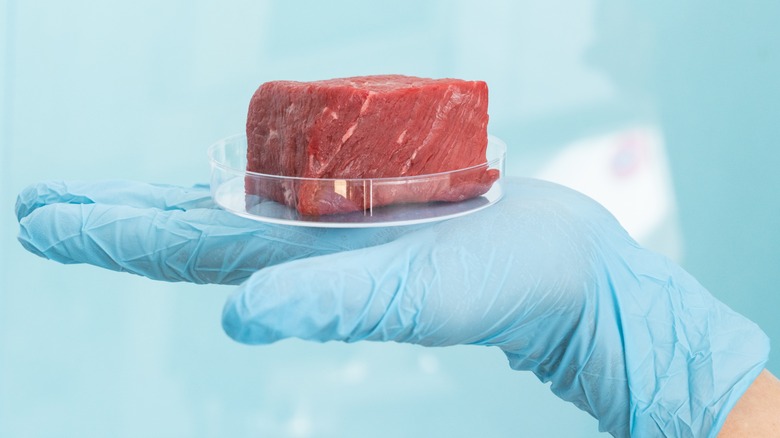Why Lab-Grown Meat May Soon Hit Your Local Grocery Store Shelves
Burgers, diamonds, human organs, and coral reefs — what do these things have in common? They can all be produced in a laboratory setting (via The Week). Lab-grown meat, also known as cultured meat, is made possible by advancements in biotechnology. According to Scientific American, the process begins with an extraction of stem cells from animal muscle which then enters a multiplication process. The process is thought to be so efficient that just a single sample from an animal could be used to make enough meat to feed something in the order of tens of thousands of people a serving of meat.
WebMD reports that cultured meat has many advantages when compared to factory farming. For example, growing meat in a lab may produce cleaner meat with fewer antibiotics. Further, cultured meat may be better for the planet since it requires less natural resources to produce. While the idea of lab-grown meat may not sound appetizing to everyone, it could be a cleaner option for the body and planet. A recent announcement by the United States Food and Drug Administration (FDA) could help make cultured meat available to consumers in the near future.
Is lab-grown meat safe to eat?
Recently, the FDA assessed UPSIDE Foods — which produces lab-grown chicken — and determined that the company's processes warranted "no further questions" from the FDA. This basically means that the FDA agrees with UPSIDE Foods' claim that its lab-grown chicken is safe for consumption. Notably, while the completion of this pre-market evaluation is the first of its kind, it does not guarantee that UPSIDE Foods' lab-grown chicken will be approved for market sale. For example, The New York Times reports that the company still needs to pass an inspection from the United States Department of Agriculture.
While lab-grown meat promises to create a cleaner planet, some researchers are not so sure. A 2019 study published in the journal Frontiers in Sustainable Food Systems estimated the environmental impacts of cultured meat and beef cattle farming over the coming 1,000 years. The researchers compared the global warming effects of the byproducts of cattle farming — methane — to the byproducts of cultured meat — carbon dioxide. The researchers concluded that while cattle farming may initially have a greater global warming impact, in the long term, the carbon dioxide emissions from cultured meat could equal or even surpass emissions from cattle farming. All in all, cultured meat may be another band-aid solution to a larger issue that society faces.


